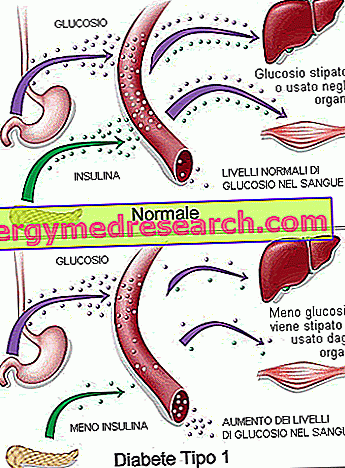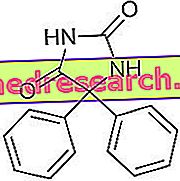Generality
When we talk about natural antacids, we want to indicate all those substances of natural origin that can counteract the excessive gastric acidity and the resulting symptoms.
By definition, antacids are all those substances which - in the true sense of the word - neutralize the acidity of gastric juices. However, in many cases, all natural antacids are also combined with remedies that do not carry out a true neutralization of acidic fluids, but which have properties that can counteract or limit the symptoms and consequences typical of gastric hypersecretion.
Please note
Natural antacids and food supplements that contain them should not be considered as substitutes for a pharmacological therapy against stomach acid. In fact, natural antacids, even though they may prove useful in mild cases, are not drugs and are not able to cure severe and / or pathological gastric hyperacidity .
Therefore, before resorting to the use of similar remedies, it is essential to contact your doctor .
Licorice
Licorice ( Glycyrrhiza glabra ) is considered one of the natural antacids par excellence, although, in truth, it does not neutralize the acidity of gastric juices.

In fact, this plant has more of a protective function against the mucous membrane of the stomach, alleviating symptoms and preventing the consequences of excessive acid secretion. More in detail, anti-inflammatory and cytoprotective properties are ascribed to licorice, widely confirmed by several studies.
Of course, to exercise his activity, licorice must be taken orally immediately after meals, for example, in the form of an infusion or decoction . However, for more information on this, we recommend reading the dedicated article: Treating with Licorice.
Possible Pharmacological Interactions
Licorice contains several molecules that can interfere with the activity of drugs such as:
- Diuretics and laxatives;
- Anti-inflammatories (both NSAIDs and steroids);
- Antiarrhythmics and digitalis;
- Oral contraceptives;
- Insulin.
Side effects
Licorice is known for its ability to increase blood pressure. In fact, especially after prolonged use, this plant or its derivatives can cause hypertension. In addition, licorice can also promote the appearance of hypokalemia, arrhythmias and sodium retention.
Contraindications
The use of licorice and its derivatives is contraindicated in the following cases:
- Ascertained hypersensitivity to one or more plant components;
- Hypertension;
- Hypokalemia;
- Salt and water retention;
- Overweight;
- Severe hepatic failure and / or liver cirrhosis;
- Severe renal failure;
- Cardiac arrhythmias;
- Diabetes mellitus;
- Neuromuscular disorders;
- In pregnancy and during lactation.
Chamomile
Similarly to what has been said for licorice, even chamomile ( Matricaria recutita ) is not able to neutralize the acidity of gastric juices.

However, this plant is often included in the group of natural antacids. This is because chamomile is capable of exerting an anti-inflammatory activity against the mucous membranes of the digestive system; therefore, it may be useful for reducing inflammation and irritation triggered by acid gastric hypersecretion.
More precisely, the chamomile appears to be particularly useful in those disorders of the gastrointestinal tract characterized by inflammation and irritation associated with spasms (the plant is, in fact, also endowed with antispasmodic properties of the digestive tract).
The most common form by which chamomile is taken is the infusion .
Possible Pharmacological Interactions
Chamomile may interfere with the activity of drugs such as coumarin anticoagulants, calcium channel blockers, statins, cisapride, benzodiazepines and sedative drugs.
Contraindications
Chamomile has no particular contraindications, except in cases where there is a known plant allergy.
As for the use of chamomile in pregnancy, however, although there are no real contraindications, caution is advised.
Altea
Altea ( Althaea officinalis ) is another plant whose extracts are used as natural antacids but whose mechanism of action does not consist in neutralizing the acidic environment of the stomach.

Althea, in fact, has anti-inflammatory properties of the gastric and esophageal mucosa and emollient properties conferred by its high mucilage content.
This plant, therefore, can be useful more than anything else as a gastroprotector, since it is able to protect the mucous membranes of the digestive system from acid hypersecretion of the stomach, alleviating the symptoms it induces. Also in this case, the plant must be taken orally. For more information, see the article: Curing with Altea.
Possible Pharmacological Interactions
Since the altea is rich in mucilages, its use, as well as the use of its extracts can hinder the absorption of oral drugs. For this reason, in the event that it is necessary to take medicines of any type, the administration of the latter must take place at least two hours before taking the plant or its derivatives.
Contraindications
Althea is generally contraindicated in children under 12 years of age and, as a precaution, also in pregnancy and during lactation. Of course, the plant should not be taken even in case of a known allergy.
Sodium bicarbonate
Although sodium bicarbonate is part of the composition of real drugs used to counteract stomach acid and to aid digestion, it is fully part of the group of natural antacids.

Sodium bicarbonate, in fact, acts precisely by neutralizing the excessively acidic environment of the stomach, thereby also alleviating the disorders and symptoms that arise from acid hypersecretion. In detail, the compound performs its action by reacting with the hydrochloric acid present in the stomach according to the following chemical reaction:
NaHCO3 + HCl → NaCl + H2O + CO2
Thanks to this mechanism of action, the sodium bicarbonate is able to decrease the levels of hydrochloric acid, thus raising the pH at the gastric level.
However, for more detailed information on the characteristics and use of sodium bicarbonate, see the dedicated article: Bicarbonate to Digest.
Possible Pharmacological Interactions
Due to its ability to raise the stomach pH, taking sodium bicarbonate can interfere with the gastric absorption of acidic drugs.
Furthermore, this natural antacid may slow down the elimination of basic drugs via the kidneys.
Side effects
Among the side effects that can occur after taking sodium bicarbonate, we mention: flatulence, stomach cramps, water retention and metabolic alkalosis.
Contraindications
Although sodium bicarbonate is a freely available product, its use is contraindicated in various situations, such as:
- Known hypersensitivity to the product;
- In patients with kidney disorders or diseases;
- In patients with hypertension;
- In patients suffering from heart failure;
- In pediatric age;
- Pregnant.
Use during breastfeeding is, however, considered safe.
Other Natural Antacids
Also some remedies proposed by alternative medicines - such as, for example, homeopathy and biochemical therapy by Schüssler - could be included in the group of natural antacids.
Please note
The practices described below are not accepted by medical science, have not been subjected to experimental tests conducted with scientific methods or have not passed them. Such practices, therefore, could be ineffective or even be dangerous to health .
The information given is for illustrative purposes only.
Homeopathy
Among the natural antacids proposed by homeopathic medicine, we recall the following remedies:
- Argentum nitricum 6CH : is a homeopathic remedy of mineral origin used in the treatment of various disorders of the digestive tract, many of which characterized by the presence of gastric hyperacidity. Generally, we recommend taking 3 granules every 1-3 hours.
- Kalium carbonicum 6CH : it is another remedy of mineral origin. Exploited from homeopathy for the treatment of digestive disorders, stomach acid and gastroesophageal reflux. The dose that is usually recommended is 3 granules every 3-6 hours.
- China 6CH : is a homeopathic remedy of plant origin that is mainly used in the treatment of gastritis and gastroesophageal reflux. The generally recommended dose is 3 granules every 3-6 hours.
Schüssler salts
As for the use of Schüssler salts as natural antacids, the usual remedy used in this area is salt number 9 ( Natrium phosphoricum ). In fact, as part of Schüssler's biochemical therapy, this salt is considered to be the remedy able to regularize the acid-base balance. Therefore, its administration - to be performed after meals - should be able to restore normal physiological conditions to the gastric level. Of course, there is no reliable scientific data capable of supporting such a theory.
Supply
Proper Nutrition as Support for Natural Antacids
The diet plays a very important role in the presence of gastric hyperacidity and constitutes a real support to the intake of natural antacids or to any pharmacological therapies prescribed by the doctor.
To counteract, or at least limit, the excessive production of acid at the gastric level, in fact, some foods should be avoided and meals should be made at regular times. In this regard, below are some useful tips:
- Avoid eating fried foods, spicy and / or overly spicy foods;
- Avoid or limit the consumption of coffee, chocolate and alcoholic beverages;
- Avoid over-abundant meals;
- Prefer light and easily digestible foods;
- Reduce or eliminate the use of salt altogether (in fact, salt can promote acid secretion of the stomach);
- Chew slowly;
- Always have lunch and dinner at the same time.
Pregnancy and breastfeeding
Can Natural Antacids Be Used in Pregnancy and During Lactation?
Although natural antacids are not medicines but remedies of natural origin, it does not mean that their use is safe in pregnancy and during breastfeeding. On the contrary, as seen in the article, the use of some of these products is expressly contraindicated during gestation and during the breastfeeding phase.
For this reason, before taking natural antacids of any kind, pregnant women and breastfeeding mothers should definitely seek advice from their doctor.



